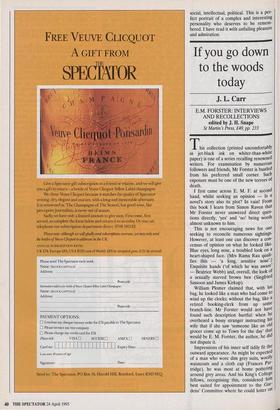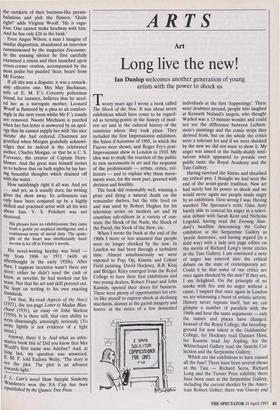If you go down to the woods today
J. L. Carr
E.M. FORSTER: INTERVIEWS AND RECOLLECTIONS edited by J. H. Snape St Martin's Press, £40, pp. 233 This collection (printed uncomfortably in jet-black ink on whiter-than-white paper) is one of a series recalling renowned writers. For examination by numerous followers and friends, Mr Forster is bustled from his preferred small corner. Such exposure must be one of the new terrors of death.
I first came across E. M. F. at second hand, whilst seeking an opinion — Is a novel's story also its plot? In vain! From this book I learn from Simon Raven that Mr Forster never answered direct ques- tions directly, 'yes' and 'no' being words almost unknown to him.
This is not encouraging news for one seeking to reconcile numerous sightings. However, at least one can discover a con' census of opinion on what he looked like. Blue eyes, long nose, a troubled look on a heart-shaped face. (Mrs Rama Rau quali- fies this — 'a long, sensitive nose') Exquisite hands ('of which he was aware — Beatrice Webb) and, overall, the look of a sexually starved brown hen (Siegfried Sassoon and James Kirkup).
William Plomer claimed that, with his bag, he looked like a man who had come to wind up the clocks; without the bag, like a retired booking-clerk from up some branch-line. Mr Forster would not have found such description hurtful: when he overheard a bossy stranger instructing his wife that if she saw 'someone like an old grocer come up to Town for the day' that would be E. M. Forster, the author, he did not dispute it.
Impressions of his inner self tidily fit the outward appearance. As might be expected of a man who wore dim grey suits, woolly waistcoats and a cloth cap (Frances Par- tridge), he was most at home pottering around grey areas. And his King's College fellows, recognising this, considered him best suited for appointment to the Gar- dens' Committee whei.e he could loiter on the outskirts of their business-like peram- bulations and pick the flowers. 'Quite right!' adds Virginia Woolf. 'He is vagu- lous. One cannot make headway with him. And he has only £26 in the bank.'
Even Angus Wilson, a man I imagine of similar disposition, abandoned an interview commissioned by the magazine Encounter. In the ensuing silence he first carefully examined a zinnia and then launched upon street-corner oration, accompanied by the most polite but puzzled 'hear, hears' from Mr Forster.
If all this was a disguise, it was a remark- ably effective one. Mrs May Buchanan, wife of E. M. F.'s Coventry policeman friend, for instance, believes that he need- ed her as a surrogate mother. Leonard Woolf is flattered by a plea to sit comfort- ingly in the next room whilst Mr F.'s tonsils are removed. Naomi Mitchison is puzzled when her fan letter is answered by an apol- ogy that he cannot supply her with 'the nice shrubs' she had ordered. Chairmen are gratified when Morgan gratefully acknowl- edges that he indeed is the celebrated author, Charles Morgan, or that he is C. S. Forrester, the creator of Captain Horn- blower. And the great man himself invites us to believe that on bath nights he lay hav- ing beautiful thoughts which drained off with the water.
How satisfyingly right it all was. And yet • . and yet, as it usually does, his writing gives the show away. Its artlessness can only have been conjured up by a highly skilled and practised artist with all his wits about him. V. S. Pritchett was not deceived.
His phrases have no exhibitionism: they came from a gentle yet sceptical intelligence and a continuous sense of moral duty. The apolo- gist of the heart was intellectually hard: no-one is let off in Forster's novels.
His novel-writing heyday was brief say from 1906 to 1911 (with an afterthought in the early 1920s). After then, I suppose incentive wasn't there any more: either he didn't need the cash or knew, as novelist, he had worked out his seam. Not that his art and skill petered out. He kept on writing to his own exacting standards.
Test that. Re-read Aspects of the Novel (1921), the ten-page Letter to Madan Blan- chard (1931), an essay on John Skelton (1950). It is there still, that rare ability to write disarmingly, amusingly, seriously. (To write lightly is not evidence of a light mind.) Anyway, there it is. And what an infor- mative book this is! Did you know that Mrs Woolf's first name was Adeline? And, at long last, my question was answered. E. M. F. told Eudora Welty, 'The story is not the plot. The plot is an advance towards light.'
L. Carr's novel How Steeple Sinderby Wanderers won the FA Cup has been republished by the Quince Tree Press.



























































 Previous page
Previous page